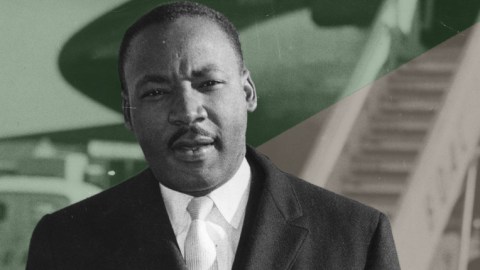Just how controversial is Dodge Ram’s MLK Super Bowl ad?

A Super Bowl ad for Dodge Ram trucks has sparked controversy for using audio from a sermon delivered by Dr. Martin Luther King, Jr.
Both social media and those directly tied to King’s legacy can’t quite agree on what to make of the ad, which received approval from King’s estate.
The minute-long commercial features audio excerpts from King’s “The Drum Major Instinct” sermon and begins by noting that the civil rights leader gave the sermon 50 years ago to the day. The ad then shows scenes of Americans plugging away at various jobs: firemen rescuing a dog, an engaged teacher writing on a chalkboard, soldiers marching in formation, and one scene where a Dodge Ram truck drives down a small town street carrying a church, honest to God.
In the sermon, King warns against man’s need to feel superior—or against the drum major’s “desire to be out front, a desire to lead the parade.” He argues that people should instead harness that natural instinct “to be first in love, to be first in moral excellence and to be first in generosity.” It was the last sermon King gave before his assassination.
Dodge Ram thought its ad was in step with King’s message.
“In the spirit of Dr. Martin Luther King, Jr., Ram truck owners also believe in a life of serving others,” reads the video description on the Ram Trucks YouTube page. A representative for the truck manufacturer told April Glaser at Slate that the brand “worked closely with the representatives of the Martin Luther King Jr. estate to receive the necessary approvals,” adding that “estate representatives were a very important part of the creative process.”
Still, not everyone directly affiliated with King’s legacy seemed eager to be associated with the ad.
Neither @TheKingCenter nor @BerniceKing is the entity that approves the use of #MLK’s words or imagery for use in merchandise, entertainment (movies, music, artwork, etc) or advertisement, including tonight’s @Dodge#SuperBowl commercial.
— The King Center (@TheKingCenter) February 5, 2018
Here’s how Bernice King, Martin Luther King, Jr.’s daughter, responded when asked about it:
No.
— Be A King (@BerniceKing) February 5, 2018
The most striking objection to the ad concerns what King went on to say in his sermon:
“Do you ever see people buy cars that they can’t even begin to buy in terms of their income? You’ve seen people riding around in Cadillacs and Chryslers who don’t earn enough to have a good T-Model Ford. But it feeds a repressed ego. You know, economists tell us that your automobile should not cost more than half of your annual income. So if you make an income of $5,000, your car shouldn’t cost more than about $2,500. That’s just good economics.”
King even comments specifically on car advertisements:
“Now the presence of this instinct explains why we are so often taken by advertisers,” King said in his sermon. “You know, those gentlemen of massive verbal persuasion. And they have a way of saying things to you that kind of gets you into buying. In order to be a man of distinction, you must drink this whiskey. In order to make your neighbors envious, you must drive this type of car. In order to be lovely to love you must wear this kind of lipstick or this kind of perfume. And you know, before you know it, you’re just buying that stuff.”
Some Twitter users reacted by calling the ad “offensive,” “tasteless,” and “tone deaf.” New York Times columnist Charles Blows wrote:
The blatant commodification of black culture, black struggle and black pain illustrates perfectly how America is perfectly willing to exploit blackness but perfectly incapable of honoring it. #DodgeRam #MLK
— Charles M. Blow (@CharlesMBlow) February 5, 2018
But the most pointed criticism came in the form of a darkly satirical remake of the commercial.
OMG someone overlayed that ridiculous Dodge/MLK ad with what King actually said about capitalism and car commercials pic.twitter.com/9IB528mCyt
— Astead (@AsteadWesley) February 5, 2018
The ad was meant to sell trucks, to be sure. But what many writers and commenters didn’t mention was that the commercial was ostensibly highlighting Ram Nation, a grassroots volunteer program that connects truck owners and dealers with community service initiatives and disaster relief efforts.
So, is the ad really that awful? Outrageously awful? Could it be that the Twitter hivemind was in some way delighted to discover that some major company had, once again, committed the grave sin of “missing the mark”? After all, there’s no shortage of immediate gratification to be found in hurling online shame at those who step out of bounds, even when the offense is relatively benign, like tastelessness.
The commercial is undoubtedly hypocritical in light of King’s commentary on advertising, and, while we’re at it, capitalism in general. But is a little hypocrisy a fair price to pay for spreading King’s message of servitude to millions of viewers? The King estate seemed to think so.
Eric D. Tidwell, the managing director of Intellectual Properties Management, Inc., which is run by King’s son and is the “exclusive licensor” of the estate of Martin Luther King, Jr., told Slate:
“When Ram approached the King Estate with the idea of featuring Dr. King’s voice in a new “Built To Serve” commercial, we were pleasantly surprised at the existence of the Ram Nation volunteers and their efforts. We learned that as a volunteer group of Ram owners, they serve others through everything from natural disaster relief, to blood drives, to local community volunteer initiatives. Once the final creative was presented for approval, it was reviewed to ensure it met our standard integrity clearances. We found that the overall message of the ad embodied Dr. King’s philosophy that true greatness is achieved by serving others. Thus we decided to be a part of Ram’s “Built To Serve” Super Bowl program.”





